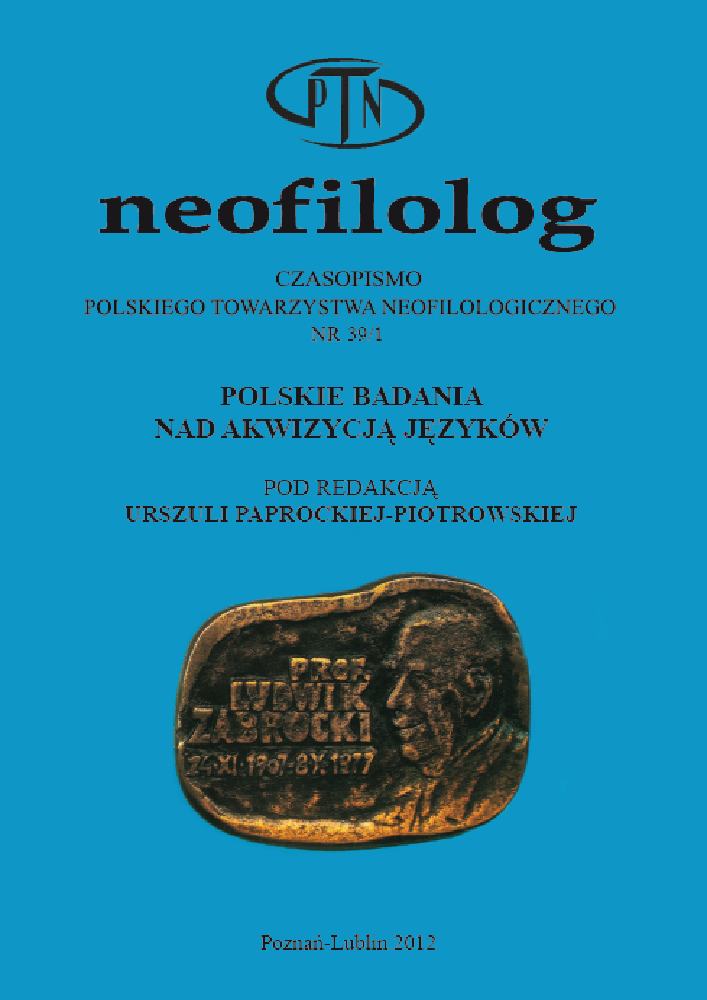Résumé
The purpose of this article is to present a report of a study on cognitive and personality factors in 44 gifted foreign language learners. The cognitive factors tested were the following: foreign language aptitude, intelligence and working memory. The personality factors included the Five Factor Model of personality, locus of control and style of coping with stress, among others. The results of the study are presented and discussed with regard to contemporary research on foreign language aptitude.
Références
Abrahamsson, N. i Hyltenstam, K. 2008. „The robustness of aptitude effects in nearnative second language acquisition”. Studies in Second Language Acquisition 30: 481-509.
Amerykańskie Towarzystwo Psychologiczne. 1985. Standardy dla testów stosowanych w psychologii i pedagogice. Biblioteka psychologa praktyka. Tom 1. Warszawa: Polskie Towarzystwo Psychologiczne. Laboratorium Technik Diagnostycznych.
Baran-Łucarz, M. 2009. „Profiles of excellent, very good, and very poor foreign language pronunciation learners”. IATEFL Pronunciation Special Interest Group Newsletter Issue NN. 1-6.
Biedroń, A. 2012. Cognitive-affective profile of gifted adult foreign language learners. Słupsk: Wydawnictwo Naukowe Akademii Pomorskiej w Słupsku.
Biedroń, A. i Szczepaniak, A. 2012a. „Working-memory and short-term memory abilities in accomplished multilinguals”. Modern Language Journal 96: 290-306.
Biedroń, A. i Szczepaniak, A. 2012b. „Polish reading span test – an instrument for measuring verbal working memory capacity” (w) Cognitive processes in language. Lodz Studies in Language 25 (red. J. Badio i J. Kosecki). Frankfurt am Main: Peter Lang: 29-37.
Birdsong, D. 2006. „Age and second language acquisition and processing: A selective overview”. Language Learning 56: 9-49.
Brzezinski, J., Gaul, M., Hornowska, E., Machowski, A. i Zakrzewska, M. 1996. Skala inteligencji D. Wechslera dla dorosłych. Wersja zrewidowana. WAIS-R (Pl). Podręcznik. Warszawa: Pracownia Testów Psychologicznych.
Carroll, J. 1993. Human cognitive abilities: A survey of factor-analytic studies. Cambridge: Cambridge University Press.
Carroll, J. i Sapon, S. 2002. Modern Language Aptitude Test. MLAT. Manual 2002 edition. N. Bethesda, Md: Second Language Testing.
DeKeyser, R. 2000. „The robustness of critical period effects in second language acquisition”. Studies in Second Language Acquisition 22: 499-533.
Gagné, F. 2005. „From gifts to talents: The DGMT as a developmental model” (w) Conceptions of giftedness. (red. R. Sternberg i J. Davidson). New York: Cambridge University Press. 98-120.
Ioup, G., Boustagui, E., El Tigi, M. i Moselle, M. 1994. „Re-examining the CPH. A case study of successful adult SLA in a naturalistic environment”. Studies in Second Language Acquisition 16: 73-98.
Long, M. 2011. Age differences, aptitudes, and ultimate L2 attainment. Referat prezentowany na 21st Annual Conference of the European Second Language Association, Uniwersytet w Sztokholmie.
McCrae, R. i Costa, P. 2003. Personality in adulthood: A five-factor theory perspective (wyd. 2). New York: Guilford Press.
Moyer, A. 1999. „Ultimate attainment in L2 phonology”. Studies in Second Language Acquisition 21: 81-108.
Niżegorodcew, A. 1979. „Rola specjalnych uzdolnień w nauce języków obcych w szkole”. Przegląd Glottodydaktyczny 3: 31-41.
Pastuszek-Lipińska, B. 2008. The influence of music education and training on SLA (w) Proceedings of the 2nd ISCA workshop on experimental linguistics, ExLing. Athens, Greece. 169-172.
Robinson, P. 2002. „Learning conditions, aptitude complexes and SLA: A framework for research and pedagogy” (w) Individual differences and instructed language learning (red. P. Robinson). Philadelphia, PA: John Benjamins: 113-133.
Rysiewicz, J. 2007. „A study on the prediction of success in the learning of English as a SL” (w) On foreign language acquisition and effective learning (red. J. Arabski). Katowice: Wydawnictwo Uniwersytetu Śląskiego: 133-156.
Schneiderman, E. i Desmarais, C. 1988. „The talented language learner: Some preliminary findings”. Second Language Research 4: 91-109.
Sękowski, A. 2004. „Psychologiczne uwarunkowania wybitnych zdolności” (w) Psychologia zdolności. Współczesne kierunki badań (red. A. Sękowski). Warszawa: Wydawnictwo Naukowe PWN: 30-44.
Skehan, P. 1998. A cognitive approach to language learning. Oxford: Oxford University Press.
Smith, N., Tsimpli, I., Morgan, G. i Woll, B. 2011. The signs of a savant. Language against the odds. Cambridge: Cambridge University Press.
Turula, A. 2009. „Wrażliwość konstrukcyjna jako element zdolności językowych na różnych poziomach zaawansowania. Analiza porównawcza” (w) Język, poznanie, zachowanie. Perspektywy i wyzwania w studiach nad przyswajaniem języka obcego. (red. J. Nijakowska). Łódź: Wydawnictwo Uniwersytetu Łódzkiego: 47-62.
Wojtowicz, M. 2006. Test zdolności językowych. Warszawa: Pracownia Testów Psychologicznych.
Licence
© Adrianna Biedroń 2012

Ce travail est disponible sous licence Creative Commons Attribution - Pas de Modification 4.0 International.
Auteurs :
Les auteurs de textes acceptés pour publication dans la revue Neofilolog sont tenus de remplir, signer et renvoyer à l'adresse de la rédaction, un accord sur l'octroi d'une licence gratuite pour les œuvres, avec obligation d'accorder une sous-licence CC.
En vertu de cet accord, les auteurs des textes publiés dans la revue Neofilolog accordent à l'Université Adam Mickiewicz de Poznań une licence non exclusive et gratuite et permettent l'utilisation de la sous-licence Creative Commons Attribution-NoDerivatives 4.0 International (CC BY-ND 4.0).
Les auteurs se réservent le droit de disposer librement de l'œuvre.
Utilisateurs :
Les utilisateurs d'Internet intéressés ont le droit d'utiliser les œuvres publiées à partir de l'année 2017 sous réserve des conditions suivantes :
- reconnaissance de la qualité d'auteur - l'obligation de fournir des informations sur la qualité d'auteur, le titre, la source (liens vers l'œuvre originale, DOI) et la licence, ainsi que l'œuvre distribuée ;
- sans créer d'œuvres dérivées - l'œuvre doit être conservée dans sa forme originale, p. ex. les traductions ou les interprétations ne peuvent être distribuées sans le consentement de l'auteur.
Tous les textes publiés sont soumis au droit d'auteur.
Autres :
L'Université Adam Mickiewicz de Poznań se réserve le droit à la revue dans son ensemble (mise en page, forme graphique, titre, conception de la couverture, logo, etc.).
.
